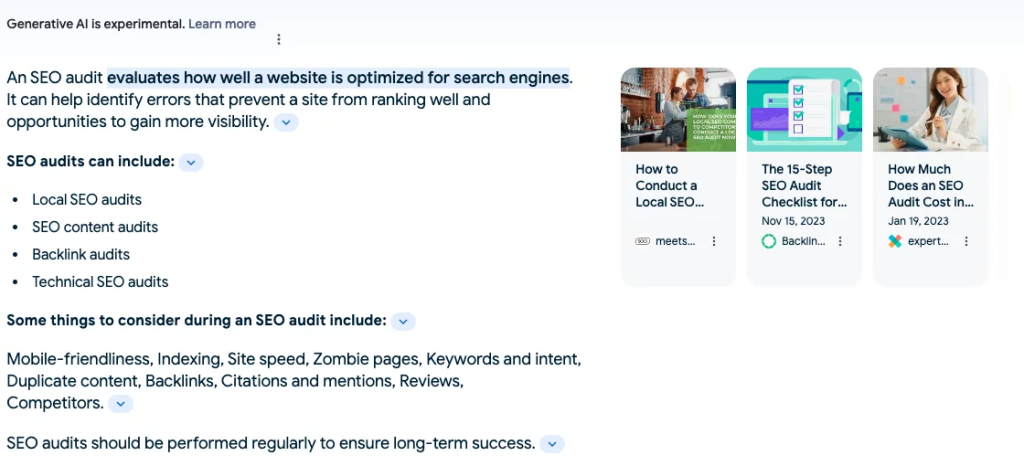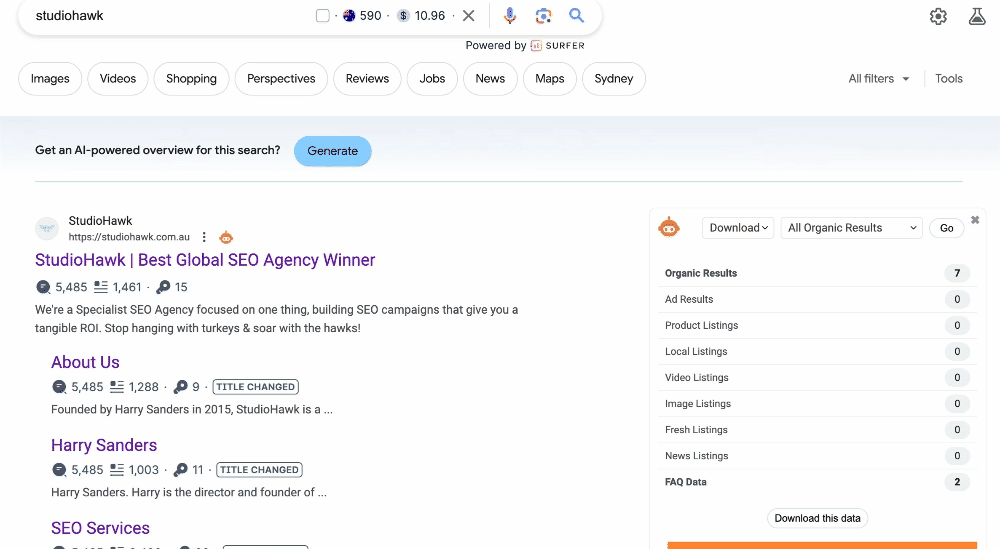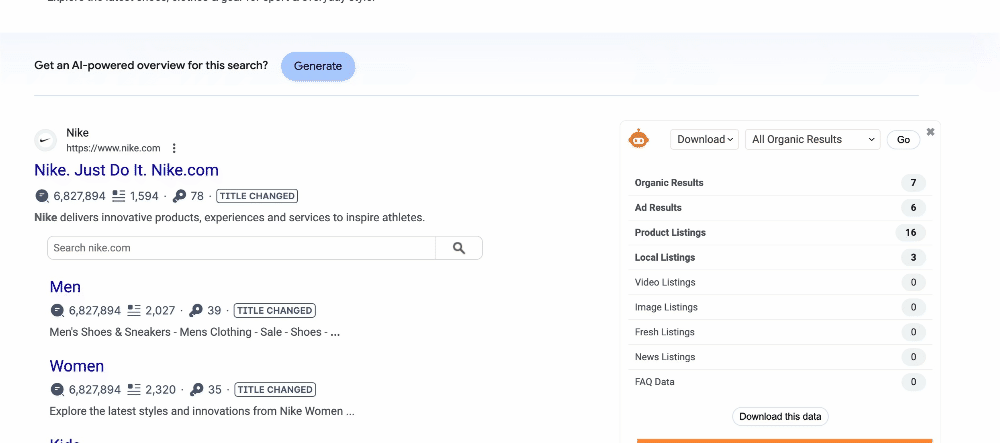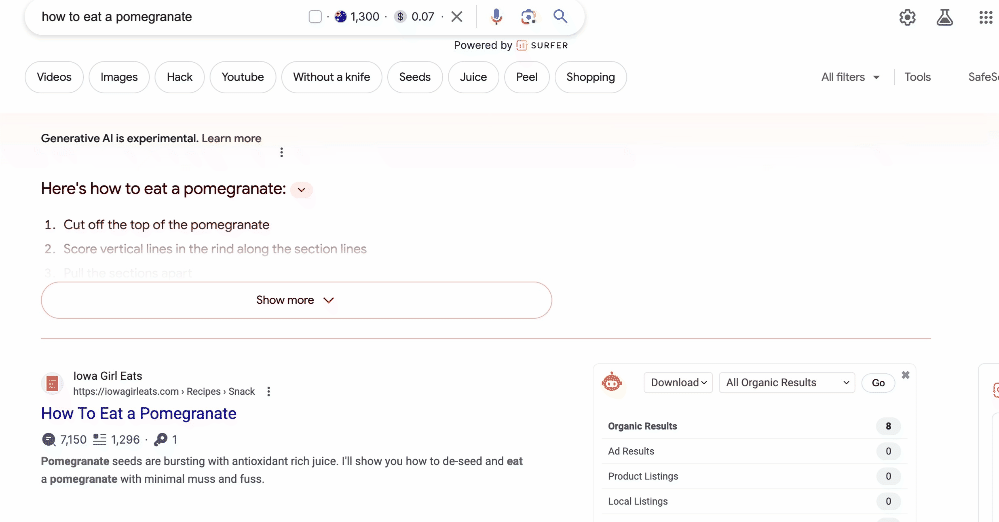To rank in Google’s AI Overviews, focus on answering your audience’s key questions with clear, concise content to gain rankings on ; use simple sentences for easy understanding of the page topic.
What Is Google’s AI Overview?
Google’s AI Overview is a search engine feature that leverages generative AI to provide answers to user queries. Along with direct AI-generated responses, it also includes links to websites that help validate or expand on the answer.
Originally tested as SGE throughout 2023, it launched as AI Overviews in May 2024. Currently, it’s only accessible in the USA, though users outside the US can access it via a VPN set to a US location.
Here’s an example of what an AI Overview search results page looks like:

Search Engine Optimization (SEO) experts expect a massive potential organic traffic impact of up to 30% when released, as they take up the real estate on the results pages, conversion rates will change off the back of a shake up like this.
Traffic drops will depend on the enhancements made by AI Overviews, there may also be traffic gains for those that play the game correctly.
There are also still searches with no AI Overviews result and revert to the usual ten-blue links we’ve been getting for years.
Therefore, how exactly AI Overviews will affect organic search traffic until its actual launch is still unknown.
So, it’s time to prepare with an understanding of the rank in AI Overviews.
For ranking in AI Overviews, here’s the TLDR:
- Build Brand Authority: Establish your credibility in Google’s knowledge graph by maintaining a clean website, producing quality content, and having a solid backlink profile.
- Deepen Keyword Research: Conduct in-depth keyword research, focusing on long-tail keywords and SERP intent analysis to align with AI Overview’s conversational search queries.
- Enhance Content for AI Overviews: Structure your content to mirror featured snippets, incorporating diverse elements like lists, videos, and alternate options.
- Use Simple, Engaging Language: Write content that is direct, concise, and conversational, catering to the preferences of AI Overviews results.
- Focus on Unique and Helpful Information: Ensure your content offers unique insights and practical advice, standing out from competitors to achieve higher rankings.
What Triggers AI Overviews?
AI Overviews in Google Search appear when Google decides a generative AI response is the best way to answer a query.
They are triggered mainly by:
- Broad informational searches
- Searches for well-known people, brands, or events
- High search volume queries
- Complex topics needing simple explanations
- Queries where information comes from multiple sources
AI Overviews are still evolving. SEO professionals should watch how they affect rankings and adjust strategies as needed.
How to Rank in AI Overviews
To rank in Google’s AI Overviews, understand that the Search Engine Results Page (SERP) is designed to answer a user’s search query, where a keyword represents the question people seek information on about a topic or point.
An AI O result will be generated automatically with a “featured snippet on steroids,” it will open up a dedicated page where they can ask questions directly to AI Overviews.
The AI-generated text response includes a carousel of selected sites providing more information on the topic.
With this being a new type of result, to optimize for it, you have to take specific steps to build your brand, understand the further result, and optimize based on what it’s giving you.
It also has “follow-up questions” that engage with the user as part of this search experience, similar to an AI tool like ChatGPT or Bard in a conversational mode.
Here’s How to Prepare for AI Overviews:
Despite massive changes, SEO professionals and marketers have opportunities to thrive and drive website traffic by preparing for AI Overviews; they need not close shop.
Build your Brand Authority First
Google’s AI Overviews needs to comprehend who you are, what you offer, and why you are credible enough to be ranked.
To do this, you must build brand authority, meaning that your business or website is a known entity in Google’s knowledge graph.
To check just Google your brand

This is the branded search for StudioHawk; it has relevant content and a description that is correct that describes the business and it’s services.
Also review if you’re in a first-page result for non-branded keywords relevant to your business. If you aren’t appearing at all, you must work to get SEO traction first.
Traditional SEO techniques are still very relevant for AI Overviews. With them, you will have a strong foundation.
First, I’d focus on the basics of SEO:
- A clean website has little to no technical issues
- Strong SEO-focused, high-quality content
- An overall content strategy for target keywords
- A healthy backlink profile (consider digital PR)
- User-friendly experience
At the end of the day you want to have the answers to questions through your relevant content.
Have people clicking on your website, those click-through rates are an important signal.
Next up is giving Google signals of experience, expertise, authority, and trust. These are the criteria for the Search Engine Evaluators to manually assess search results and train Google’s LLM to know what results are essentially good or bad.
To do this, you need to provide them with a reason to involve trust signals, such as pages on:
- Terms of Use
- Security
- Policy on privacy.
- Team / about us page.
- Reviews from customers.
- News, accolades, testimonials, awards.
- Social media platforms with consistent posting

The largest brands have no issue with this as there are so many collaborating sources that AI Overviews can use to value its trusted brand and present a profound AI Overviews result for the user.
To recap, invest time into your brand from an SEO perspective and overall marketing play to enhance your trust with search engines.
Deepen Keyword Research
Keyword research is an essential part of SEO that helps website owners identify words and phrases their target audiences will likely search for.
The same goes for an AI Overviews result.
The difference is that after looking through the standard search volume and difficulty metrics, you need to do SERP intent analysis with the added complexity of what an AI Overviews result is looking for.
Here’s an example:
“running shoes”
At first glance, this is transactional intent; people are looking to buy shoes.
The AI Overviews result presents information and data on running shoes.
Going down the search result page, we see shopping results.
There’s conversational follow up questions:
Then, people also asked questions.
Then, a running shoe guide
This is a highly mixed intent of results, likely a problematic keyword search to go after unless you have high rankings already.
When fat head keywords like “running shoes” are searched for, the AI Overviews result provides different questions related to the main keyword.
Long-tail keywords are composed of multiple words and more accurately reflect the natural conversational tone, which today’s algorithms favor.
This is why keyword research with AI Overviews is more profound, and it provides more pathways for exploring niches, fat head, middle chunky, and low-hanging fruit keywords – these additional questions lead to further AI-generated answers and so on.
Keyword selection is understanding what the SERP intent wants to see and finding new niche keywords to target if a term is too difficult because of the mixed search intent or competitors.
The key is incorporating these phrases into your content naturally while ensuring its relevance and value, so users click the link and engage with your page or website when they land there.
Use AI Overviews to Enhance Your Content
What’s excellent about AI Overviews result is they’re aggregating content for us to know what Google thinks is valuable as a quick snapshot of information to a user.
Example:

“how to eat a pomegranate.”
First, it gives us a four-dot-point list.
Then, an alternative option
Then, other ways to eat it as a dish
Then a full video
One tactic to maximize the chances of your content getting cited by AI Overviews is to mirror the format and content of existing featured snippets.
Featured snippets often contain summarized responses supplied directly from a website, which appear at the top of many searches.
So, for the example above, I would make sure my content targeting the same term has
- A quick list
- Alternative option
- Other ways to use
- And video content
Video content is a noticeable SEO trend, and Google favors more audiovisual content. I call it diversity of content.
If you’re seeing that you’re content his all points, go for the one you don’t have, example a lower quality video in the search results, you can make one better, go for it!
It allows users to engage in content and stay on the page.
In summary, profoundly analyzing the AI Overviews result and using those snippets of content to put onto your content is a surefire way to rank in AI Overviews results.
Simple, Short, Engaging, Direct Language
The natural language capabilities of search engine algorithms have drastically revolutionized content optimization.
The optimization is no longer about manually stuffing generic keywords into web content. It has become an endeavor to create conversational and relatable content that can engage readers.
People browsing the web usually want quick, straightforward answers. They only have time for short, simple texts.
So, it’s best to keep things short and sweet when writing for the web. Think about how you’d explain something to a friend. That’s the natural, engaging style search engines and readers prefer.
You will see this in AI Overview results as well:
The above is short, straightforward, and answers the question within a sentence, blog posts have to be catering toward this.
Write, keep it brief, and make it sound like a conversation. This helps people quickly find what they need and enjoy reading it!
Ecommerce in AI Overviews
When someone searches online intending to buy something, search engines show a special section with products at the top.
These are sponsored links directly to products that you can buy.
Category pages on eCommerce websites used to be the main focus for SEO. But now, it’s super important to make sure each product page is optimized.
This means making each product page easy for search engines to understand and find.
Schema markup is an excellent tool for this. It’s like adding extra labels to your product pages that tell search engines about the product’s price, reviews, ratings, and description.
This helps customers see right away how your product is different and better than others they’re looking at.
Ensure your feed is synced and shows little to no errors in Google Merchant Centre.
The more correct and aggregated information AI Overviews can read from your brand, the more likely you’ll appear at the top.
It’s really important to focus on making your product pages as clear and informative as possible.
Prioritize Unique And Helpful Information (Information Gain)
This means ensuring your content is as good as the top-ranking content for the same keywords. It’s about keeping up with the competition; the way to do that is to be unique and helpful above all else.
AI tools and content writing assistants can give everyone the exact headings and semantic keywords to include in the content.
Therefore, all content will be trying to mimic the top of search results.
You need to do new things behind your content that need to appear at the top of the search results.
AI Overviews will pick up on these differences and present them in the keyword search or find alternative keywords related to these unique factors – this is how you pick up organic search traffic in the future of SEO.
This targets information gain.
Information gained in the context of search engines is about ranking resources (like blogs, web pages, PDFs) based on how unique their content is compared to others.
It’s a concept from computer science used in machine learning models.
For instance, if you’re creating content on “home gardening tips,” you should research the top-ranking articles on this subject in Google.
You will likely find that these articles emphasize practical, easy-to-follow gardening techniques and advice, rather than detailed botanical history.
Your content should aim to offer straightforward, useful tips for everyday gardeners, as this approach aligns with what readers are actively seeking and what is performing well in search results.
To do well in search rankings, you need to make sure your content is just as good as, if not better than, what’s already ranking high in results and make your content informative and detailed
Unique and helpful information can include:
- Calculators
- Tools
- New statistics
- Research paper references
- Expert commentary
- Videos, podcasts
- Case studies
Google’s Helpful Content System is designed to ensure that search results display original, helpful content created for people. It rewards content where visitors have a satisfying experience and downgrades content that needs to meet expectations.
Generative Engine Optimization (GEO)
A new research paper introduces the concept of Generative Engine Optimization (GEO), a novel framework aimed at empowering content creators to enhance the visibility of their web content within the Search Generative Experience. You can read the paper here.
Here’s the methods described in GEO to optimise for AI Overviews:
- Authoritative: Writing confidently to assert expertise, like stating the effectiveness of a treatment in a health article.
- Statistics Addition: Using specific data for credibility, such as mentioning exact GDP growth in an economic analysis.
- Cite Sources & Quotation Addition: Enhancing trust by quoting experts or citing reliable sources, like in historical articles.
- Unique Words & Technical Terms: Including specialized terms where appropriate, like in tech articles.
The paper presents a new metric, “Subjective Impression,” to measure the impact of content modifications such as the inclusion of citations, quotations, and statistical data, which are shown to captivate user attention and improve the likelihood of engagement.
This falls in line with what we’ve discovered so far in the AI Overviews experiment, content creators, especially those from lower-ranked websites, can use techniques to compete on a more level playing field, ultimately leading to a richer and more diverse search experience for users.
Final Word: Get Prepared for the AI Overviews!
To prepare for AI Overviews (formerly SGE), it’s crucial to focus on existing SEO strategies that are already effective while looking at these new enhancements to inspire thinking.
Thus, use the AI snapshots to deepen research and enhance content through unique information and structured data to get these organic links.
Investing effort now, like compound interest, can yield more incredible benefits later!


